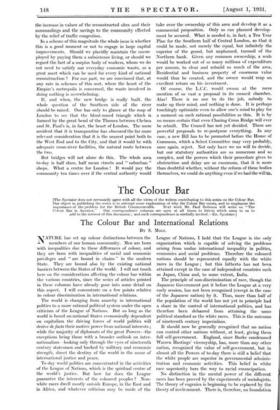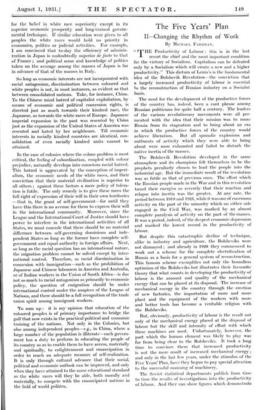The Colour Bar
[The Spectator does not necessarily agree with all the views of the writers contributing to this series on the Colour Bar: Our object in publishing the series is to attempt some explanation of why the Colour Bar exists, and to emphasize the
importance of the problem for the British Commonwealth. Next week Mr. Paul Robeson will write on "The Colour Bar in America." Our correspondence columns are open at all times to letters which seem to us to
add to the interest of this discussion ; and such correspondence is cordially invited.—En. Spectator.]
The Colour Bar and International Relations
BY S. MOGI.
NATURE has set up colour distinctions between the members of our human community. Men are born with inequalities due to these differences of colour, and they are born with inequalities of social and economic privileges and " are bound in chains " in the modern State. They are bound also by the existing national barriers between the States of the world. I will not touch here on the considerations affecting the colour bar within the various countries, since the series of articles printed in these columns have already gone into some detail on this aspect. I will concentrate on a few points relative to colour discrimination in international relations.
The world is changing from anarchy in international politics to a more rational political system under the open criticism of the League of Nations. But so long as the world is based on national States economically dependent on capitalism the driving forces of world politics will derive de facto their motive power from national interests ; while the majority of diplomats of the great Powers—the exceptions being those with a broader outlook on inter- nationalism—looking only through the eyes of nineteenth century statesmen and backed by military and economic strength, direct the destiny of the world in the name of international justice and peace.
To-day world politics are concentrated in the activities of the League of Nations, which is the spiritual centre of the world's justice. But how far does the League guarantee the interests of the coloured peoples ? Non- white races dwell mostly outside Europe, in the East and in Africa, and whatever criticism may be made of the League of Nations, I hold that the League is the only organization which is capable of solving the problems arising from undue international inequality in politics, economics and social problems. Therefore the coloured nations should be represented equally with the white races in the League ; but this hitherto has not been attained except in the case of independent countries such as Japan, China and, to some extent, India.
The principle of non-discrimination of race, though the Japanese Government put it before the League at a very early session, has not been recognized (except in the case of the Japanese nation) by it. Thus, more than half of the population of the world has not yet in principle had a share in the control of international politics, and has therefore been debarred from attaining the same political standard as the white races. This is the outcome of nineteenth century imperialism.
It should now be generally recognized that no nation can control other nations without, at least, giving them full self-government. England, since Burke condemned Warren Hastings' viceroyship, has, more than any other nation, recognized the value of self-government, but in almost all the Powers of to-day there is still a belief that the white people are superior in governmental adminis- tration and economic activities. This belief in white race superiority bars the way to racial emancipation.
No distinction in the mental power of the different races has been proved by the experiments of sociologists. The theory of eugenics is beginning to be repladed by the theory of environment. There is, therefore, no foundation for the belief in white race superiority except in its superior economic prosperity and long-trained govern- mental technique. If similar education were given to all peoples the white races would hold no priority in economics, politics or judicial activities. For example, I am convinced that to-day the efficiency of adminis- _ tration in Japan is undoubtedly superior de facto to that of France ; and political sense and knowledge of politics taken on the average among the masses of Japan is far in advance of that of the masses in Italy.
So long as economic interests are not incorporated with racial antagonism, discrimination between coloured and white peoples is not, in most instances, as evident as that between consolidated nations. Take, for instance, China. To the Chinese mind hatred of capitalist exploitation, by means of economic and political concession rights, is directed, just as much towards their kindred race, the Japanese, as towards the white races of Europe. Japanese imperial expansion in the past was resented by China just as the expansion of the United States of America was resented and hated by her neighbours. Till economic interests in racially kindred countries are identical, con- solidation of even racially kindred units cannot be attained.
In the case of colonies where the colour problem is most critical, the feeling of subordination, coupled with colour prejudice, naturally develops into conscious racial hatred. This hatred is aggravated by the conception of imperi- alism, the economic needs of the white races, and their conviction that their material civilization is superior to all others ; against these factors a mere policy of tolera- tion is futile. The only remedy is to give these races the full right of expression of their will in their own territories —that is, the grant of self-government--for until they have this there is no avenue for them to express their will in the international community. Moreover, since the League and the International Court of Justice should have power to interfere in the international activities of all States, we must concede that there should be no material difference between self-governing dominions and inde- pendent States so long as the former have complete self- government and equal authority in foreign affairs. Next, so long as the racial question has an international nature, the migration problem cannot be solved except by inter- national control. Therefore, as racial discrimination in connexion with immigration—such as the prohibition of Japanese and Chinese labourers in America and Australia, or of Indian workers in the Union of South Africa—is due not so much to racial antagonism as primarily to economic policy, the question of emigration should be under international control under the auspices of the League of Nations, and there should be a full recognition of the trade union spirit among immigrant workers.
To sum up : it is my opinion that education of the coloured peoples is of primary importance to bridge, the gulf that now exists in the practical political and economic training of the nations. Not only in the Colonies, but also among independent peoples—e.g., in China, where a large number of the population is illiterate—each govern- ment has a duty to perform in educating the people of its country so as to enable them to have access, materially and spiritually, to enlightenment and emancipation in order to reach an adequate measure of self-realization. It is only through cultural advance that their social, political and economic outlook can be improved, and only when they have attained to the same educational standard as the white races will they be able, both morally and materially, to compete with the emancipated nations in the field of world politics,



































 Previous page
Previous page